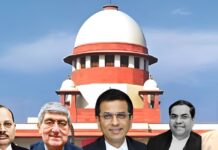The state government which wastes no opportunity to empathize with the victims of conflict made every effort to maintain the statusquo when it comes to amending the ‘draconian’ legislations used to curb political dissent in Kashmir valley, Shah Abbas reports.
As They Said…“The formation of Shri Amarnathji Shrine Board (SASB) is a part of the larger conspiracy and then to give it powers in such a manner that it acts as a state within the state.”
Syed Ali Geelani, Chairman Hurriyat (G) told Kashmir Life.
After a strong criticism, Jammu and Kashmir Legislative Assembly amended the controversial ‘Lawless law’ Public Safety Act (PSA). It was put into force in 1978 by the late Sheikh Mohammad Abdullah ‘to curb the timber smuggling in the state’ but, contrarily, it has been always used against the political opponents by the governments from time to time.
Under the new provisions, the government has now reduced the minimum period of detention under the Act to six months from two years, while no persons below the age of 18 years can be detained under this law.
However, in contravention to its earlier stand, the government has now provided the minimum age limit for the detainee under the Act as 18 years for both state and non-state subjects. In the ordinance, which was sent to the Governor earlier, the government had made a distinction between the state and non-state subjects, which was objected by the Governor, who returned the ordinance to the government for reconsideration.
 During Amaranth land row agitation in 2008, and the 2010 uprising, many minors were booked under PSA on the charges of stone pelting. The stipulated period of eight weeks prescribed for State Advisory Board to give its opinion has been reduced to six weeks, while the maximum period of detention of 12 months stipulated in section 18 of the Act – in case of persons acting in any manner prejudicial to the maintenance of public law and order – has been reduced to three months in the first instance extendable to 12 months.
During Amaranth land row agitation in 2008, and the 2010 uprising, many minors were booked under PSA on the charges of stone pelting. The stipulated period of eight weeks prescribed for State Advisory Board to give its opinion has been reduced to six weeks, while the maximum period of detention of 12 months stipulated in section 18 of the Act – in case of persons acting in any manner prejudicial to the maintenance of public law and order – has been reduced to three months in the first instance extendable to 12 months.
Amnesty International released a report on detentions in Jammu and Kashmir under the PSA terming the Act as “a lawless law.” The Amnesty called for abolition of the system of administrative detentions in Jammu and Kashmir as it facilitates the practice of torture.
The parliament passed a bill that makes economic offences, including circulation of high quality counterfeit currency, a terrorist act. The bill was strongly supported by the Congress which had earlier repealed the infamous POTA. The critics say that by making circulation of counterfeit currency a terrorist act, Congress has practically ‘compensated’ the repealing of POTA.
Discussion on the bill in parliament generated much heat. Besides protests by opposition parties, some MPs warned the government against misuse of the anti-terror law, especially against Muslims. The bill reverses the logic of jurisprudence by saying a person will be considered guilty until proven innocent.
Besides economic offences, the bill expands the definition of terrorist act to include acts involving detention, abduction, threats to kill or injure, or other actions so as to compel an international or inter-governmental organization to comply with some demand.
In J&K, men in uniform are equipped with Armed Forces Special Powers Act, an offshoot of the colonial Unlawful Activities Act. This law makes them so powerful that they can seize the property of any citizen and even dislodge him from his house.
Ghulam Mohammad Khan Sopori, once an established businessman of Sopore, was on streets protesting over the seizure of his Srinagar home by police. Khan is an old face in Kashmir’s separatist movement. He heads the Peoples League, a constituent of Syed Ali Geelani led Hurriyat Conference. With his aged wife, daughter and three sons, Sopori has temporarily shifted to his brother’s residence in Sopore after the police sealed his Chanapora home in Srinagar.
The seizure orders were issued by then Police Chief, Kuldip Khoda, reportedly on May 18 as his last war on pro-freedom camp before his retirement when he received a formal request from the investigating officer of a case (FIR 84/2006) registered with police station Nawgam under section 120 B (hatching criminal conspiracy) and 489 C (dealing illegal currency) and 7/25 A (Indian Arms Act, dealing with possession of weapons illegally) RPC besides 140A Unlawful Activities Act. The investigating officer, a Deputy SP rank officer, had written (SDPO/W/12/3392-95) as early as May 3 that “Khan has earned huge amount by acting as a conduit to the banned Harkat-e-Jihad-e-Islami (militant outfit) and acquired a house at Maisuma Colony in Chanapora Srinagar”. Khan’s family was marshaled out and the property was seized. Not a soul protested!
















